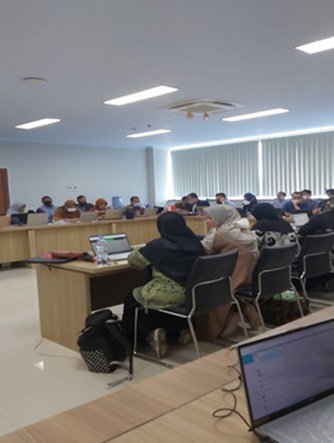Program Dukungan Pendidikan Integratif bagi Mahasiswa Lamban Belajar melalui Program Adaptive E-Learning FEBUMP Integrative Education Support Program for Slow Learners through the Adaptive E-Learning FEBUMP Program
Main Article Content
Abstract
The critical value of inclusive education is the creation of friendly learning for all students, both regular and children with special needs. The campus does not discriminate against students; all students are entitled to the same educational services. For that we need a program that helps learning. The aim is to support the learning success of slow learners, improve the quality and skills of lecturers in the teaching and learning process to support the learning success of slow learners, and provide supporting facilities for academic activities in the form of the FEBUMP Adaptive e-learning program for students to make it easier to understand the material and consult with psychologists. The method used is creating the FEBUMP Adaptive e-learning program, applied to lecturers, psychologists, and students. The results obtained are that lecturers get convenience and understanding in overcoming slow learners; students find it helpful in understanding the material and conducting counseling on the problem of slow learners; teaching and learning activities in the case of slow learners can be handled correctly and adequately without disturbing students who are not slow learners. In conclusion, this program is beneficial in creating a fair and inclusive education system.
Downloads
Article Details

This work is licensed under a Creative Commons Attribution-ShareAlike 4.0 International License.
Authors who publish with this journal agree to the following terms:
- Any article on the copyright is retained by the author(s).
- Author grant the journal, right of first publication with the work simultaneously licensed under a Creative Commons Attribution License that allows others to share work with acknowledgment of the work authors and initial publications in this journal.
- Authors are able to enter into a separate, additional contractual arrangements for non-exclusive distribution of published articles of work (eg, post-institutional repository) or publish it in a book, with acknowledgment of its initial publication in this journal.
- Authors are permitted and encouraged to post their work online (e.g., in institutional repositories or on their websites) prior to and during the submission process, as can lead to productive exchanges, as well as earlier and greater citation of published work.
- The article and any associated published material is distributed under the Creative Commons Attribution-ShareAlike 4.0 International License
References
Budiarti, E, W., Oktaviana, A., & Kamala, I. (2021). Analisis Perilaku Sosial pada Anak Slow Learner. At- Tarbawi 8(2):131-144 http://dx.doi.org/10.32505/tarbawi.v8i2.2963
Gorgi, K., Mihajlov, M., Arsenovski, S. & Chungurski, S., 2008. Evaluating Usability in Learning Management System Moodle. Int. Conf. Information Technology Interfaces, pp. 23-26. http://dx.doi.org/10.1109/ITI.2008.4588480
Khasim, N. & Khalid, F., 2016. Choosing the Right Learning Management System (LMS) for the Higher Education Institution Context: A Systematic Review. International Journal of Emerging Technologies in Learning, 11(6), pp. 55-61. http://dx.doi.org/10.3991/ijet.v11i06.5644
Mulyani, D, W, C., Abidinsyah. (2021). Strategi Pembelajaran Peserta Didik Anak Berkebutuhan Khusus (ABK) di SDN Antar Baru 1 Marabahan. Jurnal Pendidikan Hayati, 7(4) 197-216
Mumpuniarti, Rudiyati, S., Sukinah, Cahyaningrum, E, S. (2023). Kebutuhan Belajar Siswa Lamban Belajar (Slow Learner) di Kelas Awal Sekolah Dasar Daerah Istimewa Yogyakarta. Repository : Universitas Negeri Yogyakarta
Noviandri, H., & Masruroh, F. (2021). Cooperative Positive Learning dalam Pendidikan Inklusi. Klaten : Lakeisha
Probosiwi, R. (2017). Desa Inklusi Sebagai Perwujudan Pembangunan Berkelanjutan Bagi Penyandang Disabilitas. https://doi.org/10.31105/mipks.v41i3.2255
Younis, S. & Batinah, S. R., 2008. Slow Learners: How are they Identified and Supported?. International Journal, Volume I, pp. 166-172.
